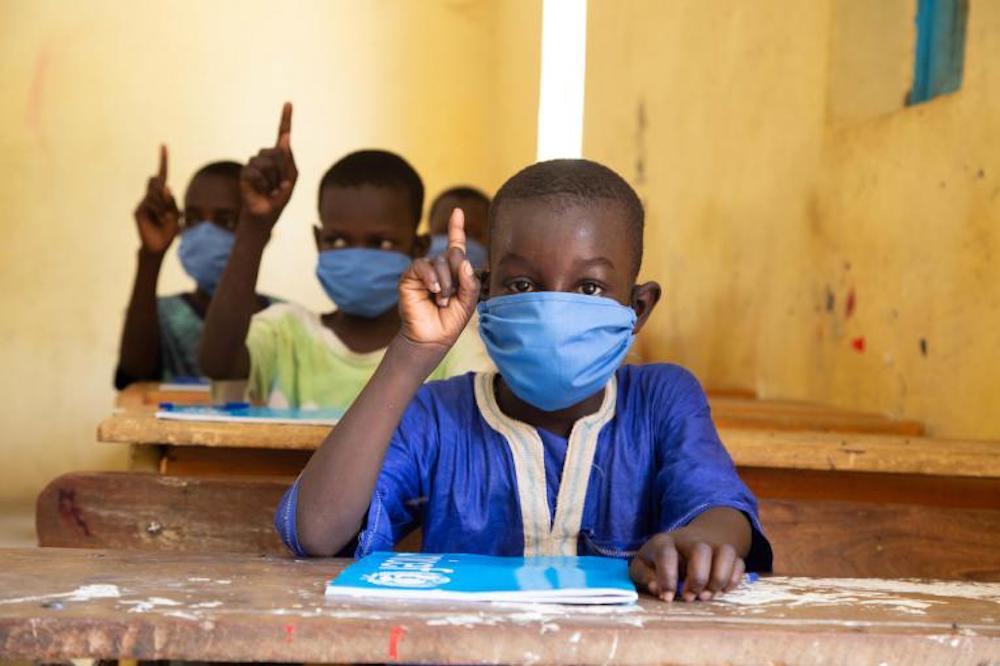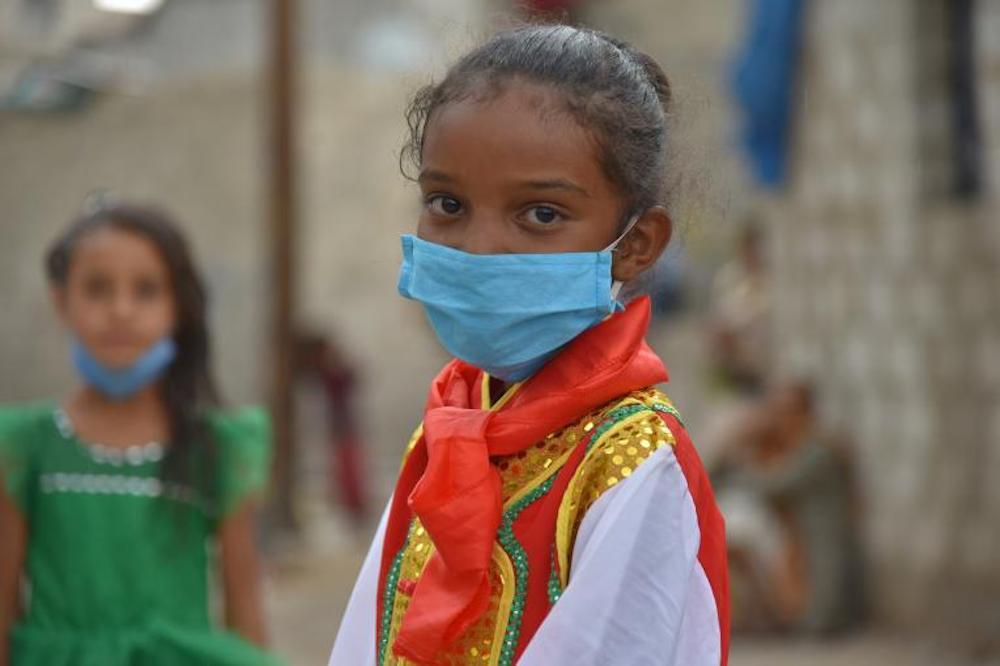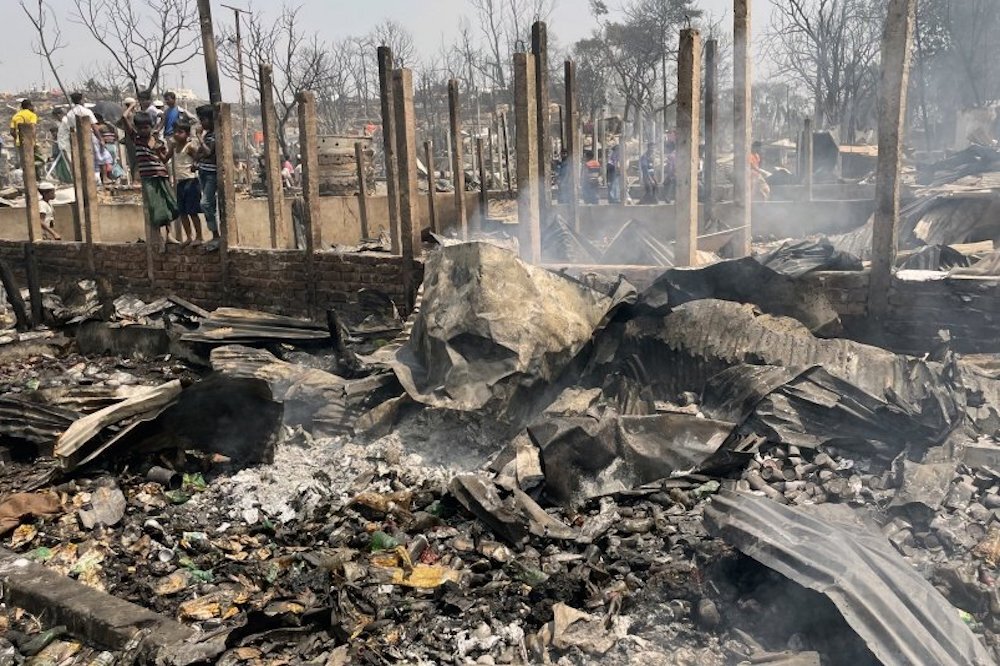
Five things you need to know this week about global education

Early childhood development
How 400 million children are being helped by education programmes launched during the pandemic - and the Nigerian woman who has started school at the age of 50.
Global projects deliver learning during pandemic
At least 400 million children and 12 million teachers are benefitting from projects launched in 112 countries by members of the Global Education Coalition in response to the Covid-19 pandemic.
There are 233 projects, such as the online learning platform Imaginécole, which is helping more than six million students and 200,000 teachers in 10 West African countries.
Progress made by the coalition, whose member organisations and businesses include Theirworld, was highlighted at a meeting of 85 education ministers held by UNESCO this week to mark a year of the health crisis. They outlined measures to keep schools open, address learning losses and adapt their education systems.
UNESCO Director-General Audrey Azoulay said: “In the face of a prolonged crisis, we must redouble our mobilisation and target the right priorities, those that will allow us to truly make education a common good, a fundamental right. The first of our principles is that schools are irreplaceable, as the pandemic has shown.
“Education recovery means keeping schools open, maintaining them safe and ensuring learners are not left behind.” @AAzoulay #LearningNeverStops https://t.co/qJklzeIR3R pic.twitter.com/pei4po0O4K
— Education 2030 (@Education2030UN) March 29, 2021
“The second is that more than ever we need resilient and innovative school systems to face present and future shocks. The third is that no screen can ever replace a teacher.”
The Global Education Coalition was established by UNESCO last year after more than 1.5 billion learners were forced out of school at the height of lockdowns.
Despite progress, almost half of the world’s student population is still affected by full or partial school closures and nearly a third cannot access remote learning. A new UNESCO study also shows that more than 100 million children will fall below the minimum proficiency level in reading due to the impact of school closures.
Covid education tracker launched

The Covid-19 Global Education Recovery Tracker captures ongoing information about the global status of schools, teachers and students (UNICEF)
A database has been launched to measure the impact of the pandemic on education across the world.
Johns Hopkins University, the World Bank and UNICEF have partnered to create the Covid-19 Global Education Recovery Tracker. The tool will help countries’ decision-making by tracking reopening and recovery planning efforts in more than 200 nations and territories.
Data up to early March 2021 showed that 51 countries had fully returned to in-person education. In more than 90 countries, students are being taught by a combination of methods.
France will close its schools and child care centres for three weeks from Monday as its enters its third national lockdown. Classes were shut for two months during the first lockdown but open during the second one.
Starting school ... at the age of 50
It's never too late to learn, says 50-year-old Nigerian school pupil https://t.co/oXAdf8QArO pic.twitter.com/wsVYzxx5sZ
— Reuters (@Reuters) March 30, 2021
Shade Ajayi had never set foot in a classroom until middle age. Now 50, the businesswoman is happily learning to read and write alongside students nearly four decades younger than her.
Donning the uniform of pink dress and bonnet, she joins hundreds of pupils at a school in Ilorin, in Nigeria’s western Kwara state. She said: “I’m not ashamed that I wear a uniform.”
As a child, she worked in her aunt’s shop instead of attending school. She now runs her own business, making and selling purses and bags, but believes her inability to read or write is holding her back.
Ajayi signed up to attend school last year, only for it to close due to the pandemic. But schools reopened in January and Ajayi finally got her chance. Her teacher, Nasrat Busari, said: “She has been coping well with the children – playing together, talking together and discussing things together.”
Refugee camp fire hits Rohingya education

Damage from the massive fire that spread through the refugee camp on March 22 (UNHCR / Louise Donovan)
Rohingya children will fall even further behind with their education after the deadly fire that damaged the world’s biggest refugee camp in Bangladesh.
The blaze at Cox’s Bazar last week destroyed 163 learning spaces, affecting the education of more than 13,000 Rohingya children, according to aid agencies.
Bangladesh’s schools will reopen next month after closures caused by the pandemic. But Save the Children said it will take more than three months to rebuild the facilities. All 18 learning spaces run by the organisation were destroyed, along with all their books and educational materials.
“Rohingya refugee children have already had their education hugely disrupted and now they will be dragged even further behind. Any hopes they had of an education have literally gone up in flames,” said Onno van Manen, Save the Children’s Country Director in Bangladesh.
Early childhood boost in Ethiopia
የከተማ አስተዳደሩ ለህጻናት ትኩረት የሚሰጥ እና ከተማችን ለህጻናት አመች እንዲሆን የሚሰራ እንዲሁም በልዩ ሁኔታ የሚታቀፉ ከ 330,000 በላይ የሚሆኑ በዝቅተኛ የኑሮ ደርጃ ላይ የሚገኙ ቤተሰቦችን ተጠቃሚ የሚያደርግ ፕሮግራም አስጀምረናል። 1/3 pic.twitter.com/WHVsnbDKSQ
— Adanech Abiebie (@AdanechAbiebie) March 27, 2021
A new initiative will deliver early childhood development services to all families in Ethiopia’s capital Addis Ababa by 2025. It will begin by targeting 330,000 low-income households – introducing parent coaching programmes and expanding access to health and social support services.
Young children will also benefit from the development of 16 day care centres, 14 model preschools, 10 outdoor playgrounds and 30 open roads on Sundays which will provide safe spaces for children to play.
“Early childhood development is a top priority for the Addis Ababa City administration. We want to ensure that all children in this city have the best start in life, helping to create a better future for themselves and for Ethiopia,” said Mayor Adanech Abiebie.
Early childhood education is crucial to give children the best start in life and be ready for primary school. Before the pandemic, more than 2.6 million children of primary school age were out of school in Ethiopia.
More news

